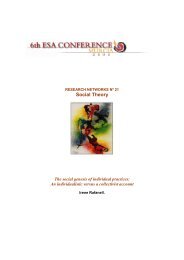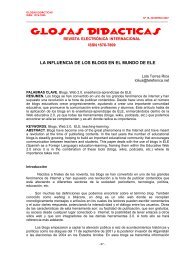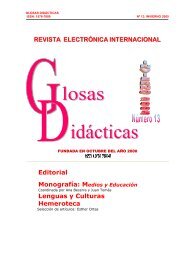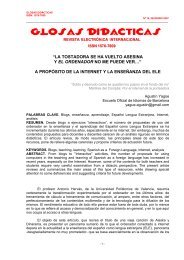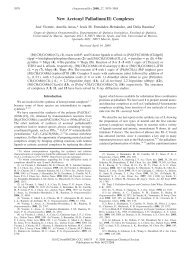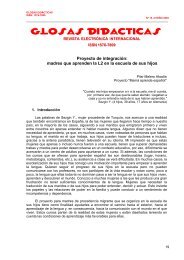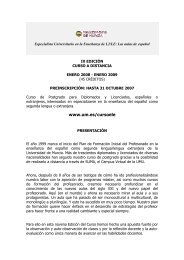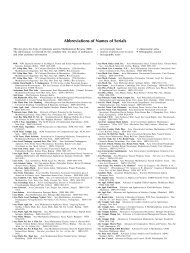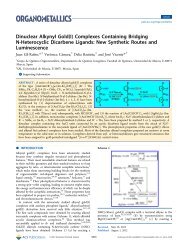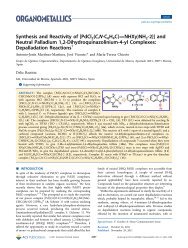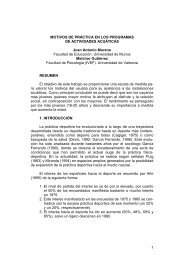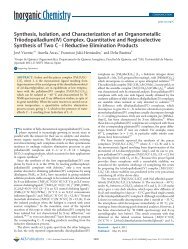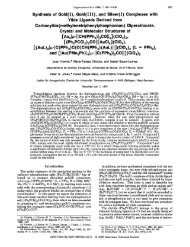Variación gramatical y segundas lenguas. El uso de ser, estar ...
Variación gramatical y segundas lenguas. El uso de ser, estar ...
Variación gramatical y segundas lenguas. El uso de ser, estar ...
Create successful ePaper yourself
Turn your PDF publications into a flip-book with our unique Google optimized e-Paper software.
GLOSAS DIDÁCTICAS<br />
ISSN: 1576-7809<br />
Nº 15, OTOÑO 2005<br />
_______________________________________________________________________________________________________<br />
Así, en (1a) el <strong>uso</strong> <strong>de</strong>l verbo <strong>ser</strong> nos indica que la propiedad <strong>de</strong> <strong>ser</strong> alto es inherente al<br />
sujeto. Por el contrario, el verbo <strong>estar</strong> en (1b) indica que la propiedad <strong>de</strong> <strong>estar</strong> contento es<br />
transitoria.<br />
En otras <strong>lenguas</strong> solo existe un verbo copulativo:<br />
(2) a. Maria è intelligente ITALIANO<br />
‘María es inteligente’<br />
b. Maria è stanca<br />
‘María está cansada’<br />
(3) a. Peter is tall INGLÉS<br />
‘Pedro es alto’<br />
b. Peter is tired<br />
‘Pedro está cansado’<br />
(4) a. Mun⎢aa só⎥⎟aa ai PENYABÍ (Bhatia, 1993: 82)<br />
chico atractivo es<br />
‘<strong>El</strong> chico es atractivo’<br />
b. Raajuu bái hiaa ai<br />
Raju sentado es<br />
‘Raju está sentado’<br />
Pero también es muy frecuente que las <strong>lenguas</strong> construyan sin verbo este tipo <strong>de</strong><br />
estructuras, es <strong>de</strong>cir, simplemente yuxtaponiendo el sujeto y el predicado, especialmente si el<br />
tiempo <strong>de</strong> la frase es presente:<br />
(5) a. Ma lì hěn cǒng míng CHINO (Li y Thompson, 1987: 98)<br />
Molly muy inteligente<br />
‘Molly es muy inteligente’<br />
b. Yugon gillen ni SONINKÉ (Girier, 1996: 99)<br />
hombre gran<strong>de</strong> AUX.<br />
‘<strong>El</strong> hombre es gran<strong>de</strong>’<br />
c. Al-jāru latīfun ÁRABE (Lecomte, 1980: 110)<br />
el+vecino amable<br />
‘<strong>El</strong> vecino es amable’<br />
d. Hinog ang mga mangga TAGALO (Schachter, 1987: 214)<br />
maduro PART. PL. mango<br />
‘Los mangos están maduros’<br />
e. Argaz-a d asebhan BEREBER (Sarrionandia, 1905: 373)<br />
hombre+este PART. bueno<br />
‘Este hombre es bueno’<br />
f. Léna glupá RUSO (Comrie, 1987: 76)<br />
Lena estúpida<br />
‘Lena es estúpida’<br />
66



